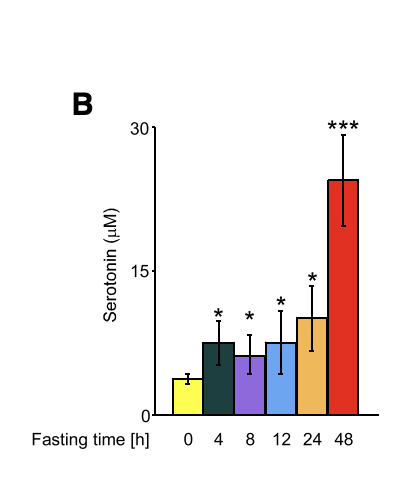Gut-dervided serotonin (GDS)
-
Peatbot: Based on the provided context, gut serotonin can have several negative health implications. Here are some key points:
-
Intestinal Irritation and Systemic Effects: Intestinal irritation can lead to the absorption of serotonin into the bloodstream. This serotonin, when carried to the lungs, can interfere with the lungs' detoxifying capacity, potentially allowing serotonin to reach the brain and activate stress responses, leading to increased cortisol production and tissue breakdown.
-
Bone Health: Serotonin produced in the intestine has been linked to bone loss. Inhibiting intestinal serotonin synthesis has been shown to stop bone loss and promote bone-building effects.
-
Stress and Depression: Increased serotonin from the gut can act as a stress signal when it reaches the brain, potentially leading to depression and activating the body's stress system.
-
Energy Production: Serotonin can reduce energy production by inhibiting mitochondrial respiratory enzymes and interfering with glucose utilization.
-
Inflammation and Disease: High levels of gut serotonin are associated with various inflammatory conditions and diseases, including headaches, asthma, heart disease, muscular dystrophy, and inflammatory brain diseases.
-
Dietary Factors: Certain dietary components, such as fermentable fibers and polyunsaturated fatty acids, can increase serotonin production in the gut, potentially leading to negative health effects.
In summary, while serotonin plays important roles in the body, excessive gut serotonin, particularly when it enters the bloodstream and affects other organs, can have several detrimental health effects.
Gut-Derived Serotonin Is a Multifunctional
Determinant to Fasting Adaptation
-
-
Inhibition of gut-derived serotonin synthesis: a potential bone anabolic treatment
Abstract
Osteoporosis is a low bone mass disease most often caused by an increase in bone resorption not compensated by a similar hike in bone formation1. Since gut–derived serotonin (GDS) inhibits bone formation2, we asked whether hampering its biosynthesis could treat osteoporosis through an anabolic mechanism. To that end we synthesized and used LP533401, a small molecule inhibitor of Tph1, the initial enzyme in GDS biosynthesis. Oral administration once daily for up to 6 weeks of this small molecule prevents the development of and fully rescues, in a dose–dependent manner, osteoporosis in ovariectomized rodents because of an isolated increase in bone formation. These results provide a proof of principle that inhibiting GDS biosynthesis could become a novel anabolic treatment for osteoporosis.
Or for the non-pharmaceutical approach:
Peatbot: To lower gut serotonin, you can consider the following strategies based on the provided context:
-
Avoid Foods Containing Fermentable Fibers and Starches: These include grains, beans, and other seeds that resist quick digestion and can promote intestinal irritation, leading to increased serotonin production.
-
Consume Fibrous Foods with Antibacterial Properties: Foods such as bamboo shoots and raw carrots contain antibacterial chemicals that help reduce endotoxin and serotonin levels in the gut.
-
Use Activated Charcoal: Activated charcoal can absorb many toxins, including bacterial endotoxin, which is likely to reduce serotonin absorption from the intestine. However, it should be used intermittently as it can also bind or destroy vitamins.
-
Consider Theanine Supplementation: Theanine, an amino acid found in tea, has been reported to decrease the amount of serotonin in the brain by decreasing its synthesis and increasing its degradation.
-
Supplement with Progesterone, Thyroid, and Niacinamide: These substances can help reduce serotonin formation and/or accelerate its elimination. Niacinamide, in particular, seems to increase serotonin uptake.
-
Address Hypothyroidism: Since hypothyroidism is a common cause of increased serotonin, supplementing thyroid hormone until symptoms are resolved can help normalize serotonin levels.
By implementing these strategies, you may be able to lower gut serotonin and mitigate its associated effects.
-